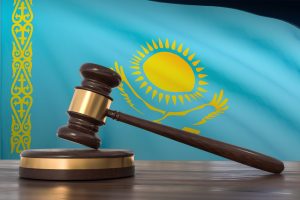On April 10, a court in Almaty handed down a suspended six-year sentence for Zhanbolat Mamai, the leader of the Democratic Party of Kazakhstan, an unregistered political party. Mamai was convicted of organizing mass unrest, spreading false information, and insulting a government representative.
Although Mamai’s prison sentence was suspended, meaning he will not be jailed, the court ordered him to not engage in political activism or journalism, and barred him from using social media, for six years. He has also been ordered to pay a fine of 600,000 tenge ($1,350). In essence, Kazakhstan has silenced Mamai.
In court, Mamai rejected the verdict against him. “Dozens of witnesses spoke here and fully confirmed that I did not call for riots,” he said, going on to call the sentenced politically motivated and stating that he will appeal.
U.S.-based human rights organization Freedom Now condemned the conviction. In a statement, Freedom Now Executive Director Maran Turner said the verdict was “the culmination of a long drawn out case of judicial harassment designed to silence Zhanbolat Mamay for his legitimate criticism of the Kazakhstani government… his conviction and the lengthy bans on various activities are punishment for and aimed at preventing him from legitimate peaceful political activity. His engagement in these activities could lead to a future arrest.”
Mamai was arrested in late February 2022 after organizing a demonstration to honor the more than 200 people who died during Qandy Qantar, or Bloody January. He was sentenced to a 15-day jail term for orchestrating an unsanctioned public event, but instead of being released in March 2022, he was re-arrested on new charges including insulting law enforcement officers and distributing “false information.” At the time, the U.S. Embassy in Kazakhstan tweeted its concern, noting, “Respecting free speech and allowing peaceful assembly is fundamental to a functioning democracy.”
In June, after his two-month pre-trial detention had been extended and his appeal to be released denied, additional charges were added, specifically “organizing mass riots.” That charge was changed to “organizing an illegal rally” in October, but in January returned, again, to the charge of “organizing mass riots.”
Mamai remained in pre-trial detention for nearly 9 months until November 2, when he was released to house arrest.
Upon hearing the verdict and the restrictions the prosecutor was seeking on April 6, Mamai quoted a Kazakh saying: “You can cut off a man’s head, but you can’t cut off his tongue.”
“I have no doubt, dear court, that you will award me these absurd restrictions. And you know, by doing so, you actually cut off my tongue, which is a direct violation of all the constitutional rights of a citizen.” He went on to say that those who “robbed the people for 30 years should answer in court” instead of him.
Mamai’s political party — the Democratic Party of Kazakhstan — has long sought official registration, but has been denied repeatedly. In 2020, activists involved with the Democratic Party were arrested on their way to take part in what was supposed to be the party’s founding congress.
Mamai had previously worked as a journalist and served time on a money laundering conviction. When he was released in 2017 he was subject to a ban on working as a journalist for three years. At the time, even the judge “said he had found no evidence of money laundering,” according to Reporters Without Borders.
Mamai’s wife, Inga Imanbai, contested the recent parliamentary elections in Kazakhstan, which featured for the first time independent candidates running for single-mandate seats across the country. Although there were 29 single-mandate seats up for grabs, only six were won by “independent” candidates — the rest were captured by candidates nominated by the country’s dominant party, formerly known as Nur Otan and now called Amanat. In Almaty, where Imanbai ran, voter turnout was officially 25 percent — with observers calling even that dismal figure inflated.
As noted above, Mamai intends to appeal his conviction and the restrictions placed upon him. His case serves to illustrate how little has changed in Kazakhstan, particularly when it comes to the freedom of speech allowed to government opposition and the ability to protest or organize.
In 2020, Kazakh President Kassym-Jomart Tokayev pushed through updates to the country’s protest laws, which were characterized as reforms. The most critical change was to be a flip in the approval process. As I wrote at the time, under the previous law, “in order to hold a legal demonstration activists had to seek the state’s permission and it was rarely granted. Under the new law, the organizers of a rally notify the authorities ahead of time.” In practice this has failed to work as stated, with authorities continuing to decline permission and individuals, like Mamai, facing charges for organizing rallies or attempting to exercise their rights to speech and assembly.






























